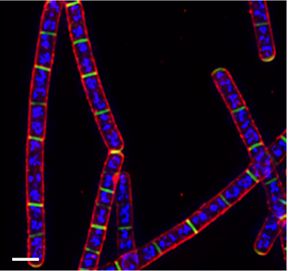PLOS ONE Goes to the Mile-High City for ASM 2013
PLOS ONE is looking forward to connecting with our editors, authors, reviewers, and readers at the 113th General Meeting of the American Society for Microbiology in Denver, Colorado. Representing PLOS ONE will be Damian Pattinson, Executive Editor; Lindsay Kelley, Editorial Board Manager; Camron Assadi, Product Marketing Manager; and myself (Meg Byrne, Associate Editor).
PLOS ONE continues to publish many high-profile papers in microbiology. Some of the most highly cited articles published since 2011 include a genomic characterization of a deadly Escherichia coli strain; a “field guide” to more than 3000 isolates of methicillin-resistant Staphylococcus aureus found around the world; the genome sequence of a novel ammonia-oxidizing archaeon (a member of the recently discovered third domain of life); and an analysis of the lung microbiomes in smokers with chronic obstructive pulmonary disease, smokers without COPD, and non-smokers.
In the last month, a number of publications have caught our readers’ eyes. These include an article showing that a breast-milk protein can help fight antibiotic-resistant bacteria; a report of a new antibiotic developed from a bacteria-killing virus; a super-phylogeny of the over 3000 bacterial and archaeal genomes that have been sequenced to date; and an analysis of the immune response to a bacterial lung infection in a 500-year-old mummy.
Come find us at the meeting: We’d love to hear your thoughts about PLOS and science publishing, in general. We’ll be at booth #350 from Sunday, May 19th through Tuesday, May 21st.
For authors: Let us show you your article level metrics (ALMs) and give you a special author t-shirt. We can also show off one of our latest features, Relative Metrics (Beta), which allows you to compare your paper’s usage to the average usage of articles in related subject areas.
For prospective authors: Please come ask us any questions you have about publishing in PLOS ONE and the family of PLOS journals. We can enumerate the many advantages of publishing in our open access journals, including free readership rights, reuse and remixing rights, unrestricted copyright, automatic posting of the article, and machine accessibility of the published article.
For PLOS ONE academic editors: We are looking forward to seeing you at our Editorial Board Reception on Monday May 20th from 5:30 to 7:30 PM at the Hyatt Regency. We would love to fill you in on our plans for the future, get your feedback, and say a huge “Thank you!” It’s also a great opportunity to meet other academic editors. Please contact Lindsay Kelley or Camron Assadi for further information.
Also, PLOS Biology is looking forward to catching up with their academic editors at a “Meet the Editors” event on Sunday May 19th between 12:30 and 2:30 PM at the PLOS Booth.
We’re looking forward to seeing many microbiologists in Denver and discussing the small but mighty microbe.
Image
Bacillus anthracis with the cell wall labelled red, the division septa labelled green, and the DNA labelled blue (Schuch et al. PLOS ONE 2013).
References
Blainey PC, Mosier AC, Potanina A, Francis CA, Quake SR (2011) Genome of a Low-Salinity Ammonia-Oxidizing Archaeon Determined by Single-Cell and Metagenomic Analysis. PLoS ONE 6(2): e16626. doi:10.1371/journal.pone.0016626
Corthals A, Koller A, Martin DW, Rieger R, Chen EI, et al. (2012) Detecting the Immune System Response of a 500 Year-Old Inca Mummy. PLoS ONE 7(7): e41244. doi:10.1371/journal.pone.0041244
Erb-Downward JR, Thompson DL, Han MK, Freeman CM, McCloskey L, et al. (2011) Analysis of the Lung Microbiome in the “Healthy” Smoker and in COPD. PLoS ONE 6(2): e16384. doi:10.1371/journal.pone.0016384
Lang JM, Darling AE, Eisen JA (2013) Phylogeny of Bacterial and Archaeal Genomes Using Conserved Genes: Supertrees and Supermatrices. PLoS ONE 8(4): e62510. doi:10.1371/journal.pone.0062510
Marks LR, Clementi EA, Hakansson AP (2013) Sensitization of Staphylococcus aureus to Methicillin and Other Antibiotics In Vitro and In Vivo in the Presence of HAMLET. PLoS ONE 8(5): e63158. doi:10.1371/journal.pone.0063158
Mellmann A, Harmsen D, Cummings CA, Zentz EB, Leopold SR, et al. (2011) Prospective Genomic Characterization of the German Enterohemorrhagic Escherichia coli O104:H4 Outbreak by Rapid Next Generation Sequencing Technology. PLoS ONE 6(7): e22751. doi:10.1371/journal.pone.0022751
Monecke S, Coombs G, Shore AC, Coleman DC, Akpaka P, et al. (2011) A Field Guide to Pandemic, Epidemic and Sporadic Clones of Methicillin-Resistant Staphylococcus aureus. PLoS ONE 6(4): e17936. doi:10.1371/journal.pone.0017936
Schuch R, Pelzek AJ, Raz A, Euler CW, Ryan PA, et al. (2013) Use of a Bacteriophage Lysin to Identify a Novel Target for Antimicrobial Development. PLoS ONE 8(4): e60754. doi:10.1371/journal.pone.0060754

